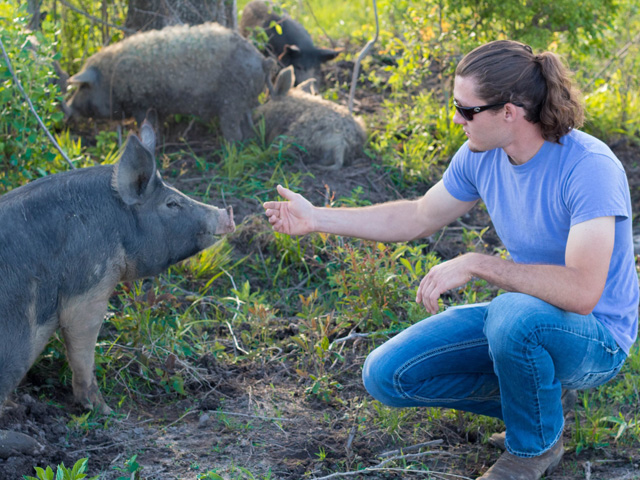Local Meat Processors Expanding
New Funds Help Niche Pork and Beef Processor Grow Business
David Carroll is happy to be one of the 167 businesses just awarded funds from USDA through a Meat and Poultry Inspection Readiness Grant (MPIRG) program. The Alabama pork producer and processing owner, one of six in the state to receive an award through the program, says these much-needed funds will help his family grow their business in the small town of Newton.
USDA announced the award of over $32 million in funds to meat and poultry slaughter and processing facilities across the country as part of a stated goal to support expansion and efficiency in the sector. Secretary of Agriculture Tom Vilsack noted the investment will help businesses like the Carrolls' recover from the pandemic and expand capacity.
"Achieving a Federal Grant of Inspection or operating under a Cooperative Interstate Shipment program allows meat and poultry processors to ship products across state lines, pursue new market opportunities, and better meet consumer and producer demand along the supply chain," said Vilsack.
MPIRG is a new program authorized in 2021 and jointly administered by USDA and the Food Safety and Inspection Service. In June 2021, the availability of $55.2 million for MPIRG funding was announced, and applications began to be accepted in August.
Carroll said they started their application process in June and were very thankful to receive a $200,000 grant to help them get their processing facility ready for the next level of inspection. He said he heard about the grant through the Niche Meat Processors Assistance Network, which he describes as a huge resource for small processing plants across the country.
P[L1] D[0x0] M[300x250] OOP[F] ADUNIT[] T[]
Carroll and his wife are first-generation producers, starting their own pork production business, and then the processing plant, from the ground up.
"I'm 25 and my wife is 26," Carroll told DTN. "We've built this facility with no bank loans. It was bootstrapping. We shopped liquidation sales for equipment and have worked hard to build a customer base and a farm. Our goal is to be able to control the quality of everything we sell off the farm. We know that consumers have to go out of their way to buy from us, and without consistent processing, we can't give them the quality they want."
The Carrolls are working with other producers in the area and today are selling halves and quarters of both pork and beef. After federal inspections are all in place, they will begin final steps, such as submitting labels for approval to begin marketing these products wholesale to other retailers, many of which they already have relationships with. The lengthy process to reach this point, adds Carroll, has been frustrating. But he is committed to seeing it through.
"Previously, the plant we have was a federal-inspected goat and lamb processing facility," he explained. "We have remodeled it to be able to handle beef and pork, and we will be using these funds to help improve the infrastructure so we can more economically process."
Once all the work is finished, Carroll said, their processing capacity will go from around 6,500 pounds a week to as much as 12,000 pounds a week. Currently, he noted, they are processing more beef. On the pork side, they want to primarily produce and sell value-added product in the future. Carroll stressed that on the pork, they don't inject their bacon, preferring to keep it truly salt cured and hardwood smoked. The process takes about three weeks.
The beef they are processing now comes from a local farmer and is grain/grass-fed. Steers are harvested around 1,200 to 1,300 pounds on the hoof. The pork comes out of the Carrolls' seedstock operation, a Berkshire-Mangalica cross they've worked over nine years to develop. Moving forward, Carroll said, they plan to work with another producer who will take the feeder pigs and finish them, bringing them in as a slaughter-ready hog at 300 to 325 pounds.
This year's awards were spread across 42 states, including: Alabama, Alaska, Arizona, Arkansas, California, Colorado, Florida, Idaho, Illinois, Indiana, Iowa, Kansas, Kentucky, Louisiana, Maine, Maryland, Massachusetts, Michigan, Minnesota, Mississippi, Missouri, Montana, Nebraska, New Jersey, New Mexico, New York, North Dakota, Ohio, Oklahoma, Oregon, Pennsylvania, Rhode Island, South Carolina, South Dakota, Tennessee, Texas, Utah, Vermont, Virginia, Washington, Wisconsin and Wyoming.
-- To see when the next round of applications is due for USDA award under the Meat and Poultry Inspection Readiness Grant (MPIRG) program, go to: https://www.ams.usda.gov/….
-- To learn more about the processing facility or the Carroll farm, go to their website: https://thepasturepig.com/….
The Niche Meat Processors Assistance Network website can be found here: https://www.nichemeatprocessing.org/….
Victoria Myers can be reached at vicki.myers@dtn.com
(c) Copyright 2021 DTN, LLC. All rights reserved.





